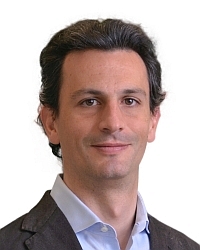TR2024-078
Data-driven monitoring with mobile sensors and charging stations using multi-arm bandits and coordinated motion planners
-
- , "Data-driven monitoring with mobile sensors and charging stations using multi-arm bandits and coordinated motion planners", American Control Conference (ACC), DOI: 10.23919/ACC60939.2024.10644645, June 2024, pp. 299-305.BibTeX TR2024-078 PDF
- @inproceedings{Nayak2024jun,
- author = {Nayak, Siddharth and Greiff, Marcus and Raghunathan, Arvind and {Di Cairano}, Stefano and Vinod, Abraham P.},
- title = {{Data-driven monitoring with mobile sensors and charging stations using multi-arm bandits and coordinated motion planners}},
- booktitle = {American Control Conference (ACC)},
- year = 2024,
- pages = {299--305},
- month = jun,
- publisher = {IEEE},
- doi = {10.23919/ACC60939.2024.10644645},
- url = {https://www.merl.com/publications/TR2024-078}
- }
- , "Data-driven monitoring with mobile sensors and charging stations using multi-arm bandits and coordinated motion planners", American Control Conference (ACC), DOI: 10.23919/ACC60939.2024.10644645, June 2024, pp. 299-305.
-
MERL Contacts:
-
Research Areas:
Control, Dynamical Systems, Machine Learning, Optimization, Robotics
Abstract:
We study the problem of data-driven monitoring using an autonomous search team. We consider a typical monitoring task of classifying a search environment into in- teresting and uninteresting regions as quickly as possible using a search team comprised of mobile sensors (e.g., drones) and mobile charging stations (e.g., ground vehicles). For widespread deployment in the physical world, the search team must also accommodate noisy data collected by the mobile sensors, overcome energy constraints on the mobile sensors which limit their range, and ensure collision avoidance for the charging stations. We address these challenges using a novel, bi-level approach for the monitoring task, where a high-level planner uses past data to determine the potential regions of interest for the drones to visit, and a low-level path planner coordinates the paths for the entire search team to visit these regions subject to the posed constraints. We design the high-level planner using a multi-armed bandit framework. For the low-level planner, we propose two approaches: an optimal integer program-based motion planner and a real-time implementable graph-based heuristic planner. We characterize several theoretical properties of the proposed approaches, including anytime guarantees, upper bounds on computing time, and task completion time. We show the efficacy of our approach in simulations, including one in Gazebo where we identify harvest-ready trees using an autonomous heterogeneous search team.
Related News & Events
-
NEWS Abraham Vinod Delivers Invited Talks at The University of Texas at Austin and The University of Texas at Dallas Date: November 11, 2025 - November 13, 2025
MERL Contact: Abraham P. Vinod
Research Areas: Artificial Intelligence, Control, Dynamical Systems, Machine Learning, Optimization, RoboticsBrief- MERL researcher Abraham Vinod was invited to present MERL's latest research at the University of Texas at Austin and The University of Texas at Dallas this November. His talk discussed a tractable set-based method for a broad class of robust control problems with nonlinear dynamics and bounded uncertainty, with applications to powered descent guidance and drone motion planning problems. Additionally, he also presented MERL's recent research on environmental monitoring using hetereogenous robots, with applications in disaster management and search-and-rescue.
-
NEWS MERL researchers present 9 papers at ACC 2024 Date: July 10, 2024 - July 12, 2024
Where: Toronto, Canada
MERL Contacts: Vedang M. Deshpande; Stefano Di Cairano; Christopher R. Laughman; Arvind Raghunathan; Abraham P. Vinod; Yebin Wang; Avishai Weiss
Research Areas: Artificial Intelligence, Control, Dynamical Systems, Machine Learning, Multi-Physical Modeling, Optimization, RoboticsBrief- MERL researchers presented 9 papers at the recently concluded American Control Conference (ACC) 2024 in Toronto, Canada. The papers covered a wide range of topics including data-driven spatial monitoring using heterogenous robots, aircraft approach management near airports, computation fluid dynamics-based motion planning for drones facing winds, trajectory planning for coordinated monitoring using a team of drones and a ground carrier vehicle, ensemble Kalman smoothing-based model predictive control for motion planning for autonomous vehicles, system identification for Lithium-ion batteries, physics-constrained deep Kalman filters for vapor compression systems, switched reference governors for constrained systems, and distributed road-map monitoring using onboard sensors.
As a sponsor of the conference, MERL maintained a booth for open discussions with researchers and students, and hosted a special session to discuss highlights of MERL research and work philosophy.
In addition, Abraham Vinod served as a panelist at the Student Networking Event at the conference. The student networking event provides an opportunity for all interested students to network with professionals working in industry, academia, and national laboratories during a structured event, and encourages their continued participation as the future leaders in the field.
- MERL researchers presented 9 papers at the recently concluded American Control Conference (ACC) 2024 in Toronto, Canada. The papers covered a wide range of topics including data-driven spatial monitoring using heterogenous robots, aircraft approach management near airports, computation fluid dynamics-based motion planning for drones facing winds, trajectory planning for coordinated monitoring using a team of drones and a ground carrier vehicle, ensemble Kalman smoothing-based model predictive control for motion planning for autonomous vehicles, system identification for Lithium-ion batteries, physics-constrained deep Kalman filters for vapor compression systems, switched reference governors for constrained systems, and distributed road-map monitoring using onboard sensors.


